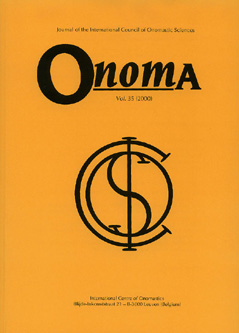 previous article in this issue previous article in this issue | next article in this issue  |

|
Document Details : Title: Onomastik und Mentalitätsgeschichte Author(s): KOHLHEIM, Volker Journal: Onoma Volume: 45 Date: 2010 Pages: 127-142 DOI: 10.2143/ONO.45.0.2182820 Abstract : Untersuchungen, in denen die Beziehungen zwischen Onomastik und Mentalitätsgeschichte explizit thematisiert werden, gibt es frühesten seit den 70er Jahren des 20. Jahrhunderts. Der Zahl nach nicht sehr groß, brachten und bringen sie jedoch einen deutlichen Erkenntnisgewinn für beide Disziplinen: Der Mentalitätsgeschichte stellt die Onomastik, besonders die Anthroponomastik, ein reiches Material zur Verfügung, welches über einen nahezu beliebig langen Zeitraum hin statistisch auswertbar ist und daher die Phänomene der longue durée, mit denen es der Mentalitätshistoriker primär zu tun hat, besonders gut erhellen kann. Der Onomastik wiederum eröffnen sich durch die Frage nach den Mentalitäten, die z. B. der Verbreitung der Heiligennamen, der Vergabe der mittelalterlichen Übernamen, der Einführung der Familiennamen oder der individualistischen Vornamenwahl der Gegenwart zugrundelagen bzw. -liegen, neue Fragestellungen und Perspektiven. Derartige Studien stellen somit einen deutlichen Fortschritt der onomastischen Forschung dar. – Vorliegende Arbeit erörtert nach einer Klärung der Begriffe 'Mentalität' und 'Mentalitätsgeschichte' zunächst deren Relevanz für die Onomastik wie auch die grundsätzliche Bedeutung namenkundlicher Studien für die Mentalitätsgeschichte. Die folgenden zwei Kapitel stellen schwerpunktmäßig Arbeiten zur Anthroponomastik vor, welche die Interdependenz von Namengebung und Mentalität besonders akzentuiert behandeln. Im 'Ausblick' wird auf weitere thematische Schwerpunkte, bei denen der Zusammenhang zwischen Mentalitätsgeschichte und Onomastik zum Tragen kommt, verwiesen und nochmals die grundsätzliche Bedeutung dieses Problembereichs thematisiert. Investigations which have as their explicit theme the relations between onomastics and the history of mentalités (HM) have only existed since the 1970s at the earliest. They are not numerous, but they have brought and still bring clear advances in knowledge for both disciplines: onomastics, especially anthroponomastics, offers HM rich material which can be statistically analysed over a period of practically any length and can therefore throw light especially well on those longue durée phenomena which are the primary concern of scholars working in HM. On the other hand, new questions and perspectives open up for onomastics through inquiry into the mentalités which underlie for example the distribution of saints’ names, the bestowal of medieval by-names, the introduction of family names, or the present-day choice of individual given names. Such studies therefore represent definite progress in and for onomastic research. The present work sets out to explain the concepts mentalité and HM and their relevance for onomastics, and also the fundamental importance of name studies for HM. Two subsequent sections introduce central works in anthroponomastics which deal with the interdependence of namegiving and mentalité in a particularly focused way. In the prospects section, indications of further thematic emphases in which the connection between HM and onomastics bears fruit are given and again the fundamental importance of this area of investigation is demonstrated. Depuis les années 1970, des recherches abordant explicitement la relation entre Onomastique et mentalité sont apparues. Bien que leur nombre ne soit pas considérable, elles ont apporté et apportent cependant un gain significatif de connaissances pour les deux disciplines: l’Onomastique, en particulier l’anthroponymie, apportent à l’histoire des mentalités un riche matériel disponible, statistiquement exploitable pour presque n’importe quelle période longue; c’est pourquoi les phénomènes de longue durée, sujet primordial pour l’historien des mentalités, peuvent être particulièrement bien mis en lumière. De nouvelles questions et perspectives s’ouvrent en revanche à l’Onomastique à travers la question des mentalités à la base par exemple de la propagation des noms de saints, de l’attribution du surnom au Moyen Âge, de l’introduction des noms de famille ou du choix individualiste des prénoms contemporains. De telles études représentent donc une avancée importante pour la recherche onomastique. Le présent article discute de la clarification des termes «mentalité» et «histoire des mentalités», de leur pertinence pour l’Onomastique, aussi bien que de l’importance fondamentale des études onomastiques pour l’histoire des mentalités. Les deux chapitres suivants présentent des travaux essentiels pour l’anthroponymie qui mettent surtout l’accent sur l’interdépendance entre nomination et mentalité. En perspective, on attirera l’attention sur d’autres points thématiques essentiels, où cette interdépendance entre en jeu, et l’on discutera à nouveau l’importance fondamentale de cette problématique. |
|
